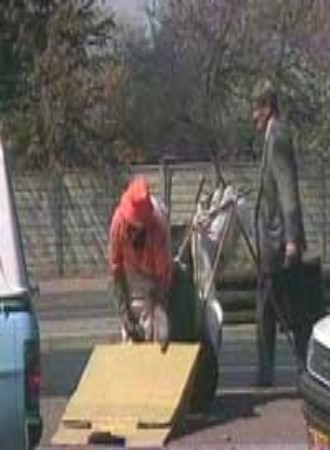
Who's Gonna Take the Weight?: African American and South African Youth 1999
Distributed by Cinema Guild, 1697 Broadway, Suite 506, New York, NY, 10019; 212-246-5522
Produced by Rico Workshop
Directed by Alonze Rico Speight
VHS, color, 60 min.
Jr. High - Adult
African American Studies
Date Entered: 11/09/2018
Reviewed by Eric Acree, Library Instruction Coordinator, Oscar A. Silverman Undergraduate Library, University at Buffalo, Buffalo, New YorkWho's Gonna Take the Weight?: African American and South African Youth is a provocative documentary drawing on the parallels and contrasts between young people of African descent in New York City, and Soweto, South Africa. Director Alonzo Rico Speight interviews youth from New York City and Soweto, engaging them in political dialogue though a series of questions about their viewpoints on the future for "African" Black people in the United States and South Africa. Some of the questions asked include: "Are you political?," "How important is education?," and "What is the most important thing to you?"
Music from both cultures sets the tone from the beginning of the video, highlighting the film's prevalent themes of oppression, marginalization, anger, and violence. Speight selects gangster rap to represent youth in the United States. South African freedom fight songs, many of them in the Zulu language, represent that culture's youth. This part of the film would have benefited from English subtitles to the Zulu songs to emphasize the common themes. Speight also does an excellent job of editing. He captures the sights and sounds of these two urban centers and is able to mix powerful visual images with the music of rapper Tupac Shakur and Bayete, a popular South African ensemble.
What was most impressive about the documentary is how well the young people, aged between sixteen and nineteen, spoke to the issue of white supremacy. The youth on both sides of the Atlantic understood the huge role that race plays in the political landscape. For example, the African American youth spoke about the impact of the heavy handed police tactics by the New York Police Department (NYPD). They believe that these tactics unfairly target them, and provide police a license to attack people of color. This reviewer is reminded of the 1997 NYPD brutal sexual attack beating of Haitian Abner Louima, and the 1999 killing of West African Amadou Diallo by NYPD. Each of these incidents created more division between the African American community and the police.
In South Africa, the Black youth spoke about the importance of Nelson Mandela coming to power. They understood the struggle that it took for Mandela to be elected President. However, what is not lost is how the whites still live in the better housing, are better educated, have better jobs, and maintain their racist attitudes towards Black South Africans. This all translates into two separate and unequal nations in South Africa, one for whites and another for Blacks.
A major message of this documentary is that both African Americans and Black South Africans believe that self-empowerment is one of the keys to overcoming the oppression that characterizes their lives. Even thought the documentary doesn't mention it, the film does a good job of helping one understand that even though Jim Crow and Apartheid are both outlawed, their effects still remain in both societies.
This video is highly recommended for middle school through adult audiences and would be an excellent medium to encourage people to think, discuss, and examine attitudes on important race relations and political issues that stretch beyond the borders of the United States and South Africa.